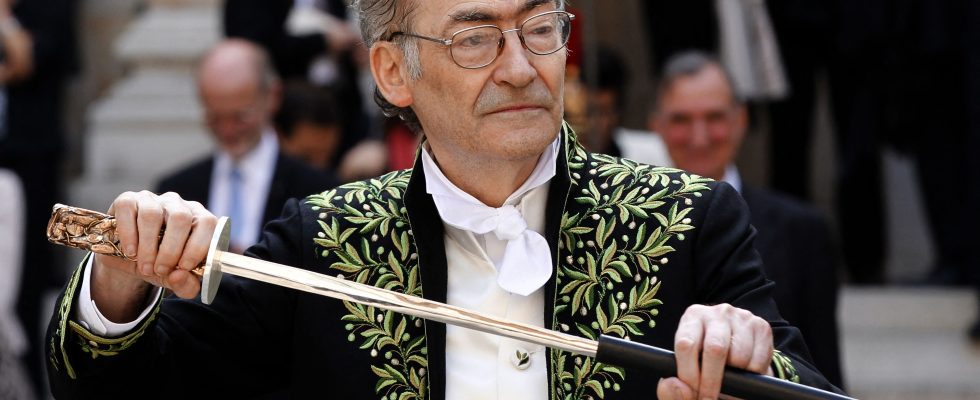June 16, 2011: more than two years after his election, François Weyergans is finally received at the French Academy. He arrived at the Quai Conti ten minutes late – a first in the history of the institution. Strapped in a costume designed by Agnès b., carrying in his hand the sword he inherited from his friend Maurice Béjart, Weyergans is true to himself: chic and airheaded. Under the Dome, Erik Orsenna welcomes him in these terms: “You are what it is agreed to call in medical textbooks, as in everyday life and Woody Allen’s films, a neurotic.” The green coat won’t cure Weyergans’ melancholy inclinations. He hardly sits at the Academy, isolates himself in his anxiety and money problems. During the last years of his life, he had a book project on Rimbaud, entitled Rim, which will never see the light of day. He died in 2019. Who still reads this joker and distinguished writer, a modern version of Diderot? Before he sinks into oblivion, the Gallimard editions devote a Quarto to him, where his talent is snorted over a thousand pages.
“I’ve always been awkward with women. I mean: not just in bed”
Born in Belgium in 1941, Weyergans nevertheless had a Laurence Sterne-style English turn of mind. Raised in an austere Catholicism, he developed a kind of Jewish humor à la Philip Roth. He escaped social conditioning, did nothing like everyone else. When he arrives in Paris at the age of 19, received first at Idhec before being sent back, he sympathizes with Giacometti, who decides to take his education into his own hands – he takes him to the brothels of Montparnasse at night. The vocation of the young François is the cinema, but after a psychoanalysis provided by Jacques Lacan himself, he turns to literature. In 1973, he published his first novel, The clown. The incipit has remained famous: “I have always been awkward with women. I mean: not only in bed.” The title is enough to prove the self-mockery of the author, a rare quality in the world of letters.
Winner of the Roger-Nimier Prize for The clownthen that of Deux Magots for Macarius the Coptic in 1982, a writer esteemed by people as different as Simenon and Fellini, Weyergans is someone who matters during his lifetime, and whose books are eagerly awaited – all the more eagerly awaited as he often postpones their publication. After the tasty I am a writer (1989), he finally won a Grand Prix d’Automne in 1992, namely the Renaudot, with Boxer’s Dementia. In 1997, he signed what is undoubtedly his masterpiece, Franz and Francois, a book about his father as touching as it is hilarious. There followed a long period of hibernation until he struck a final blow in 2005 with Three days with my motherwhich earned him the Goncourt prize in the nose and beard of Houellebecq, whose The possibility of an island was the event of the literary season. All the books mentioned can be found in the Quarto, with the bonus The life of a babya curiosity published in 1986 where Weyergans makes a mischievous and erudite fetus speak.
A master of self-writing
How to define the style of Weyergans? Let’s say that, a little like his elder Bernard Frank, he revolves around him a lot, and digresses on a whole bunch of subjects to better come back to himself. A talkative and navel-gazing author, those who don’t like him will object. A master of self-writing, will defend the happy few. Because we must not confuse egotism à la Stendhal and the autofiction of all comers, a genre that Weyergans despised, he who said: “Autofiction annoys me. When someone talks to me about it, I answer that I prefers bumper cars.”
Since we are talking about a neurotic, let us note that it is distressing that a writer thus covered with all the laurels can fall into disuse so quickly. The recent winners of Goncourt and Renaudot should learn lessons of modesty. Weyergans would have laughed about it with his air in the clouds. On Béjart’s academician’s sword, which he had made his own, he had engraved this sentence by Paul Valéry: “The more I think, the more I think.” It feels good to reopen his novels, tunnels of doubts and humor.
novels, by François Weyergans, Quarto/Gallimard, 1,376 pages, €34.
